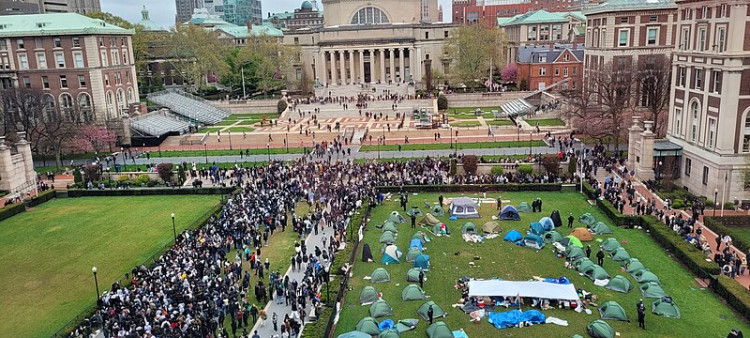The Columbia University Senate in New York City has voted in favor of a resolution calling for an investigation into the school's leadership, particularly President Minouche Shafik, amid ongoing anti-Israel protests that have disrupted campus life for over a week. The resolution, which passed with a vote of 62-14 and three abstentions, alleges that Shafik violated established protocols and the due process rights of students and faculty when she authorized the New York City Police Department (NYPD) to enter the campus and arrest protesters last week.
While the university senate does not have the authority to remove Shafik, who has been on the job for less than a year, the vote highlights the growing tension between the administration and the university community. In a statement, the university said, "The administration and Senate share the same goal of restoring calm to campus, so everyone can pursue their educational activities. We are committed to an ongoing dialogue and appreciate the Senate's constructive engagement in finding a pathway forward."
Shafik has faced increasing calls to step down amid the spread of antisemitism on campus and ongoing protests against Israel that have disrupted classes. In a statement released on Monday, Shafik expressed her deep sadness over the actions of agitators who have formed an "encampment" on the campus and riled up students and faculty with anti-Jewish slogans and chants.
The protest encampment emerged on the Columbia campus lawn on April 17, the same day Shafik faced harsh criticism from Republicans at a congressional hearing for not doing enough to combat antisemitism. Two other Ivy League presidents resigned months ago following widely criticized testimony they gave to the same committee. U.S. House Republicans from New York have also urged Shafik to resign, stating in a letter that she had failed to provide a safe learning environment as "anarchy has engulfed the campus."
The situation at Columbia is not an isolated incident, as student protests against the Israel-Hamas war have spread to universities across the United States. Protesters are demanding that schools cut financial ties to Israel and divest from companies they say are enabling the conflict. Some Jewish students have expressed concerns that the protests have veered into antisemitism, making them afraid to set foot on campus.
In response to the protests, several university presidents have called in law enforcement to remove protesters, resulting in hundreds of arrests nationwide. These decisions have prompted faculty members at universities in California, Georgia, and Texas to initiate or pass votes of no confidence in their leadership, although these rebukes are largely symbolic and do not have the power to remove the presidents.
As the tensions continue to mount, university officials are scrambling to resolve the protests, particularly with May graduation ceremonies approaching. At California State Polytechnic University, Humboldt, protesters who have barricaded themselves inside a building since Monday were given until Friday at 5 p.m. to leave and "not be immediately arrested." While some protesters left, others remained, and the campus has been closed for the rest of the semester.
At Columbia, student negotiators representing the encampment said they reached an impasse with administrators and intend to continue their protest, despite progress on a push for more transparent financial disclosures. "We will not rest until Columbia divests," said Jonathan Ben-Menachem, a fourth-year doctoral student.
The university's leadership sent a letter to Columbia students Friday night, stating that they "support the conversations that are ongoing with student leaders of the encampment." However, President Shafik faced significant criticism from faculty, with a report by the university senate's executive committee finding that she and her administration had taken actions that "harmed Columbia University," including calling in police without consulting faculty, misrepresenting and suspending student protest groups, and hiring private investigators.
"The faculty have completely lost confidence in President Shafik's ability to lead this organization," said Ege Yumusak, a philosophy lecturer who is part of a faculty team protecting the encampment.






